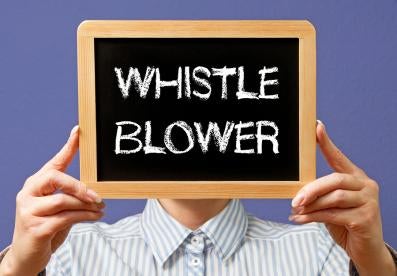On May 22, 2017, the U.S. Commodity Futures Trading Commission (“CFTC” or the “Commission”) adopted several additions to its whistleblower rules. Among other things, the amendments expand the Commission’s power to pursue anti-retaliation claims on behalf of whistleblowers and, like the SEC, now prohibit confidentiality agreements that “impede” a whistleblower’s communications with the CFTC. The CFTC first proposed some form of these amendments to its Whistleblower Rules last year.
The Dodd-Frank Act amended the Commodity Exchange Act (“CEA”) and established the CFTC’s whistleblower program, which provides monetary incentives to individuals who report possible violations of the CEA that lead to a successful enforcement action, as well as privacy, confidentiality, and anti-retaliation protections for whistleblowers who share information or assist the CFTC. Notably, the statutory language governing the CFTC’s authority to enforce the anti-retaliation provisions of Dodd-Frank is nearly identical to the language governing the SEC, and neither statute expressly empowers either agency with the ability to pursue anti-retaliation claims on behalf of whistleblowers. Until now, the two agencies had different views on the scope of their authority to enforce the anti-retaliation provisions of Dodd-Frank.
While the CFTC previously concluded that it lacked statutory authority to enforce the anti-retaliation provisions of the CEA, the Commission has now abandoned that position and concluded that it has can “bring an action against an employer who retaliates against a whistleblower, irrespective of whether the whistleblower qualifies for an award.” The CFTC highlighted that, in determining whether retaliation occurred, it will also consider actions that an employer takes after a whistleblower reported internally but before providing information to the Commission. The Commission carves out the whistleblower’s right to pursue a private cause of action against the employer regardless of the Commission’s efforts.
The CFTC’s amendments also prohibit employers from using confidentiality and pre-dispute arbitration agreements to impede an individual from communicating with the CFTC about a possible violation of the CEA by. These amendments bring the CFTC’s Whistleblower Rules in line with the SEC’s, and are particularly significant in light of the SEC’s charges against employers who used employment agreements that required employees to waive their right to receive whistleblower awards from the SEC. It follows that the CFTC is also likely to find any such waivers impermissible.
The CFTC also adopted procedural and technical amendments aimed at increasing the transparency of the whistleblower claim process and expanding eligibility requirements. In particular, the CFTC clarified that to qualify for an award, whistleblowers can notify Congress, another law enforcement agency or a foreign regulator first, and then have 180 days (as opposed to 120) to share the information with the CFTC.
The Director of the Division of Enforcement, James McDonald, explained that “[t]he Commission’s approval of these rules today will further strengthen and enhance our efforts to protect customers and promote market integrity.” These amendments are therefore consistent with other efforts the CFTC has made over the past three years to encourage reporting and “harmonize the [CFTC’s] Whistleblower Rules with those of the SEC.”




 i
i

